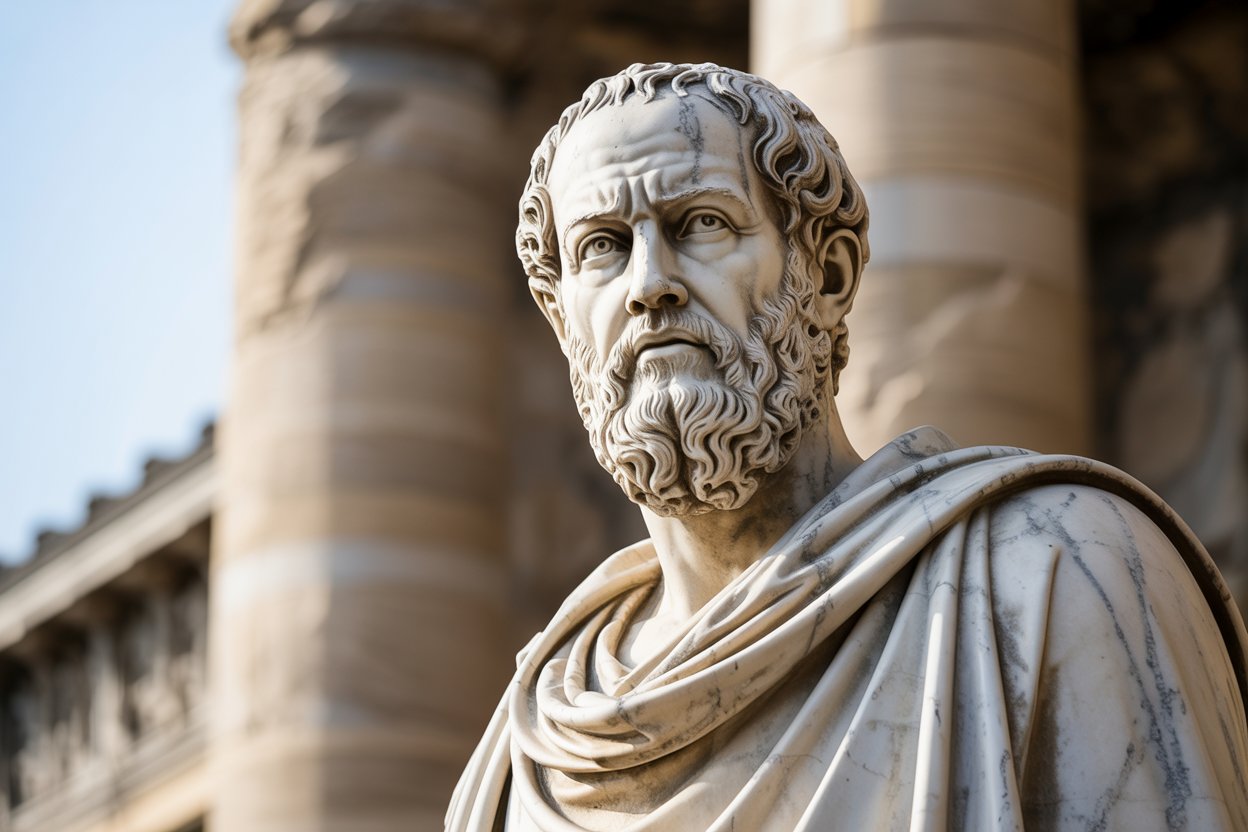Respect isn’t demanded. It’s earned through consistent behavior that signals strength, reliability, and character. The Stoics understood this centuries ago, and their philosophy offers a blueprint for gaining respect without ever having to ask for it.
The following five Stoic habits aren’t flashy tactics or manipulation strategies. They’re quiet habits that speak louder than words and make people naturally trust and admire you.
1. Staying Calm When Everyone Else Loses It
“If you are disturbed, it is your own judgment that disturbs you.” — Marcus Aurelius.
The conference room erupts. Voices rise. Accusations fly. And there you are, sitting back, breathing slowly, processing the situation while everyone else spirals. This is apatheia in action, the Stoic practice of maintaining clarity under pressure.
People naturally trust those who remain calm and composed. When a crisis hits and everyone looks around to see who’s still standing, you want to be that person. Calm is authority. The person who panics loses credibility instantly. The person who stays composed becomes the anchor.
This habit earns respect because it demonstrates self-mastery. Stoics trained themselves to distinguish between what they could control and what they couldn’t. They focused on their response, their judgment, their next move.
When you practice this consistently, people notice. They start seeking your opinion during challenging times because they’ve seen you make good decisions when everyone else was too emotional to think straight.
2. Speaking Less and Listening More
“Let silence be your general rule.” — Epictetus.
Stoics valued brevity and presence. They spoke when they had something worth saying and listened with full attention the rest of the time. This wasn’t about being withdrawn. It was about respecting the power of words and the value of truly hearing another person.
In a world where everyone wants to be heard, the person who actually listens stands out. When you give someone your full attention without interrupting or planning your next comment, you communicate something powerful. You’re saying their words matter.
This habit builds respect because it’s rare. Most people are waiting for their turn to talk, not truly listening. The person who dominates every conversation might get attention, but they don’t get respect. The person who knows when to speak and when to listen earns both respect and understanding. When you do talk, people lean in because they know you’ve thought about what you’re saying.
3. Practicing Emotional Control, Not Emotional Suppression
“The greatest remedy for anger is delay.” — Seneca.
Stoics didn’t deny their feelings or pretend they didn’t exist. They acknowledged them, examined them, and then decided how to respond. This is emotional discipline, and it’s one of the most powerful habits you can develop.
When anger surfaces, you feel it. But you don’t let it drive your actions. You pause. You breathe. You ask yourself if this reaction serves you or harms you. The gap between stimulus and response is where your power lives. When you consistently choose thoughtful responses over emotional reactions, people notice.
Emotional discipline signals maturity, strength, and trustworthiness. The person who explodes at minor inconveniences can’t be trusted with significant responsibilities. The person who stays measured even when provoked demonstrates real strength. This isn’t about being cold. It’s about being in control of yourself rather than being controlled by your circumstances.
4. Taking Responsibility Without Excuses
“You must build your life action by action.” — Marcus Aurelius.
Stoics didn’t outsource blame. They owned their choices and their outcomes. When something went wrong, they looked inward first. What could I have done differently? What was within my control? This radical ownership is uncomfortable, but it’s transformative.
When a project fails and everyone’s scrambling to assign blame, the person who stands up and says, “This was my call, and I take full responsibility,” instantly commands respect. It takes courage to own your mistakes publicly and learn from them.
This habit earns respect because blame-shifting is the default human response. We protect our egos by finding external reasons for our failures. But when you own your outcomes, good and bad, you gain the power to change them.
Taking responsibility also means following through on commitments. You don’t make promises you can’t keep. You do what you say you’ll do when you say you’ll do it. This builds a reputation for reliability that’s priceless.
5. Living by Principles, Not Impulses
“First say to yourself what you would be; then do what you have to do.” — Epictetus.
Stoics lived with internal standards. They defined their values and then aligned their actions with those values, regardless of external pressure or convenience. This means making decisions based on who you want to be, not just what feels good in the moment.
Consistency builds trust. When your behavior is predictable in a good way, when people know what you stand for and can count on you to act accordingly, you become someone they respect deeply. Living by principles requires knowing what those principles are. What do you stand for? What won’t you compromise on? Stoics didn’t leave their character to chance. They actively shaped it through conscious choices and daily practice.
This habit earns respect because people can sense authenticity. When you consistently choose principle over convenience, even when it costs you something, people notice. They might not always agree with your choices, but they respect the fact that you have principles and you stick to them.
Conclusion
Respect is earned through consistent behavior that demonstrates character. The five Stoic habits outlined here create a pattern of behavior that naturally commands respect. These aren’t quick fixes or surface-level tactics.
They’re deep practices that require daily effort and honest self-reflection. However, the respect they earn is genuine, lasting, and well worth the effort. Start practicing one today, and watch how people’s perception of you begins to shift.
